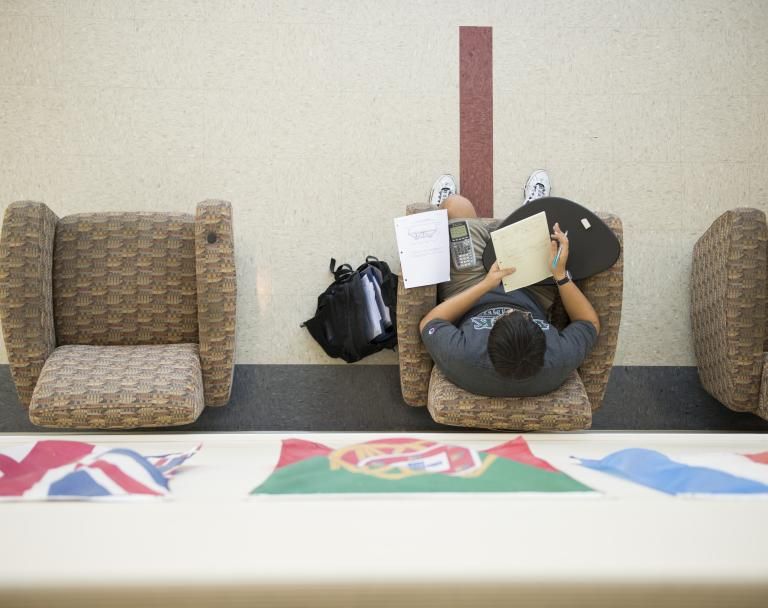From Study Stress To Success: 10 Survival Guide Tips For Finishing The Semester Strong

As the semester is rapidly coming to a close, students are longing for the promise of a relaxing summer break. However, before basking in the sunlight, there’s one last obstacle to overcome: Finals Week.
If you are feeling stressed, anxious, panicked, or bogged down, you are not alone. Whether it is your first-ever Finals Week or you are a seasoned vet, finals put a significant amount of stress on students. Here are ten tips to help manage your stress and enhance studying, based on data driven recommendations from the Mayo Clinic, Harvard Health, the American Psychology Association, and Yale Medicine.
1. Hone Your Focus
Looking at what you must accomplish in totality during Finals Week is overwhelming. This may leave you feeling stressed, making it difficult to know where you should start. Instead of looking at the big picture, narrow your focus to what is most important at that moment.
Create a list of your most important to-dos, and then arrange them based on priority. Break down large projects into smaller, more manageable tasks. Make sure you check off the items on your to-do list as you go along. This will keep you motivated, create a sense of accomplishment, and hone your focus as you continue through Finals Week.
2. Create a Schedule
During Finals Week, students can anticipate their schedule becoming inconsistent. The demanding activities of the week take up a large chunk of your days. As a result, students may involuntarily neglect their needs. To beat the stress of irregularity, create a consistent schedule and stick to it. Students should block out time during the day to complete certain tasks.
For instance, a student may dedicate a two-hour block of time daily for studying. During those two hours, you are solely focusing on studying. For the remaining 22 hours in the day, studying is no longer your focus. Instead, make sure you block out time for important needs such as hygiene, meal times, exercise, work, and rest. For a consistent schedule to be most effective, it should be in place before Finals Week. However, it is never too late to prioritize your time.
3. Study Collaboratively
It is no secret that students’ social lives take a hit during Finals Week. This can lead to feelings of isolation and loneliness. To keep in touch with your social needs while still working toward finals, consider studying collaboratively with your friends and peers. Studying together offers a range of benefits and helps enforce accountability. For friends and peers in the same class as you, you can compare notes, quiz each other, and problem-solve for harder course topics.
If you have friends who are in different classes than you, you can still study together. Consider having your friend quiz you based on your class notes or flashcards. For those preparing for an important presentation, practice for your friends and ask for constructive feedback. Try “teaching” your friend the core principles of your subject. Being able to articulate hard concepts to unfamiliar individuals signals a strong grasp of the subject matter. Finally, if you are worried about your final, contact your professor with precise questions. Aim to work together with your professor to review your study guide and to address any concerns you may have.
4. Diversify Your Study Methods
There is no one-size-fits-all approach to how humans retain and comprehend information. The way you study should be unique to your individual requirements. To best understand your needs, experiment with different study methods. This will allow you to interact with a range of information retention techniques, making you more prepared overall.
In addition, a study method that may work for one class may not work for another. Familiarizing yourself with different study methods equips you with the tools to succeed in any subject.
5. Intentionally Move Your Body
If you are crammed inside your dorm studying, you may start to feel restless. To release some of your pent-up stress, move your body with intention. According to Mayo Clinic, It is recommended that we get at least 30 minutes of exercise daily, and for good reason. The Mayo Clinic describes that physical exercise releases endorphins that reduce stress and improve mood. In addition, it reduces the negative effects of stress, improves sleep, and releases body tension.
It is important to avoid looking at physical exercise as an additional chore. Instead, find something you enjoy doing. This can range from weight lifting to yoga or dancing, or just going for a walk. Whatever you do, do it with intention. As you move your body, imagine the stress melting off of you.
6. Prioritize Your Meals
Have you ever been nervous for a presentation and felt sick to your stomach? That's because the brain and the gastrointestinal (GI) system are intimately connected. Harvard Health explains that a troubled intestine can send signals to the brain, just as a troubled brain can send signals to the gut. Therefore, irregularities in gut health or intestinal distress can contribute to anxiety, stress, and depression. During Finals Week, meal times become tricky for college students. However, to make the most of your studying efforts and to keep your GI system healthy, prioritize your meal times.
It is recommended to eat without distractions to improve eating habits. This is especially true for college students. Many students may attempt to multitask between eating and studying. However, this is actually less productive, takes longer, and increases fatigue. Instead, set a regular meal time and stick to it. Avoid any stressful distractions while you eat. Most of all, remember that food is fuel. Your brain desperately needs those extra calories to make it to the end of finals.
7. Spend Time Outdoors
As humans, we have a special bond with nature. Just going outside on a sunny day can be enough to improve mood. After all, the sun provides us with our essential life force. To make the most of your time outdoors, spend some time mindfully observing nature.
According to the American Psychological Association, mindfulness is a research proven way to reduce stress. Mindfulness is a cognitive meditation skill that has you take on the role of the observer over your thoughts and surroundings. To practice mindfulness during outdoor time, engage your five senses. What can you hear, see, smell, touch, and taste? How do those sensations make you feel? Take your time, breathing slowly and deeply. The American Psychology Association states that researchers found a variety of benefits to practicing mindfulness. Most of these benefits were related to its ability to dial down the body’s stress response.
8. Rest Is A Necessity, Not A Privilege.
The age-old tale of college students pulling all-nighters in preparation for finals is a story we are all familiar with. College students sacrificing their rest to study is not uncommon. Some even wear these intense study sessions as badges of honor. However, it is important to remember that adequate sleep is non-negotiable.
Sleep is a basic human necessity. Running on little sleep has a variety of negative effects on your brain performance. In fact, adequate sleep has been shown to improve academic performance. Moreover, getting appropriate rest increases your ability to retain information. According to the Yale School of medicine, this is because the sleeping brain provides optimal conditions for consolidation processes that integrate newly encoded memory into a long-term store. In other words, memories become more stable and long-lasting in the brain during stages of deep sleep.
9. Let Go What Is Outside Of Your Control
When we worry, it opens up the floodgates for all other stressors. On top of worrying about the outcome of finals, stress may begin to compound from your family life, personal life, and work life. Worry can take over as a constantly nagging voice in the back of your mind. However, there are ways to show your stress and anxiety whose boss.
A lot of the time, excess worry is about things outside of our own control. Next time you hear that pesky worry worm in your ear, ask yourself, “is this something I can influence?”. The beauty is, if something is outside of your control, you do not have to worry about it. The time will pass the same regardless of how you spend it. If you identify a concern that you are able to fix, you can work to figure out solutions rather than letting it control you.
10. Reach Out To A Professional
Sometimes, our needs exceed our own capabilities. When stress becomes unmanageable, it has a variety of negative impacts on our health. If you are struggling, it is okay. There are campus resources available for you. Consider reaching out for assistance from the following areas:
- Counseling Services - Whether you’d benefit from individual or group counseling, couples counseling, personal enrichment, or online mental health screenings, counseling services are here to guide you. The clinical staff members provide free, confidential counseling in accordance with the American Counseling Association's Code of Ethics, HIPAA, and FERPA. In addition, full-time undergraduate students have 24/7 access to TimelyCare, a virtual service for health and well-being.
- Academic Success Center - Offers a variety of support resources for academic success, including peer tutoring, academic coaching, exam review sessions, support for non-native English speakers, and supplemental instruction.
- Student Accessibility Services - A supportive resource for students with documented disabilities. Student Accessibility Services works to ensure equal access to campus, course content, and programming under the Americans with Disabilities Act.
- Spiritual Life - Spiritual Life helps foster relationships, find spiritual connections, enjoy fellowship, serve others, and grow spiritually and holistically. The campus interfaith chapel contains space for religious activities, meditations, meetings, and counseling.
- Health Services - Whether it is the common cold or a more serious illness, Health Services physician and nurse practitioner can help. Available by appointment, health services can provide treatment referrals, OTC medications, flu-shots, covid testing, equipment, transportation, or coordinate with a home physician to help manage a chronic illness.
- Campus Safety - The department of Campus Safety works to create a secure campus by providing professional safety, security and law enforcement. In addition, Campus Safety can provide immediate help to students through transportation and emergency services.
Above all this Finals Week, make sure you are taking care of yourself, your mental health, and your overall wellness. You’ll do great, and it will be summertime before you know it!




